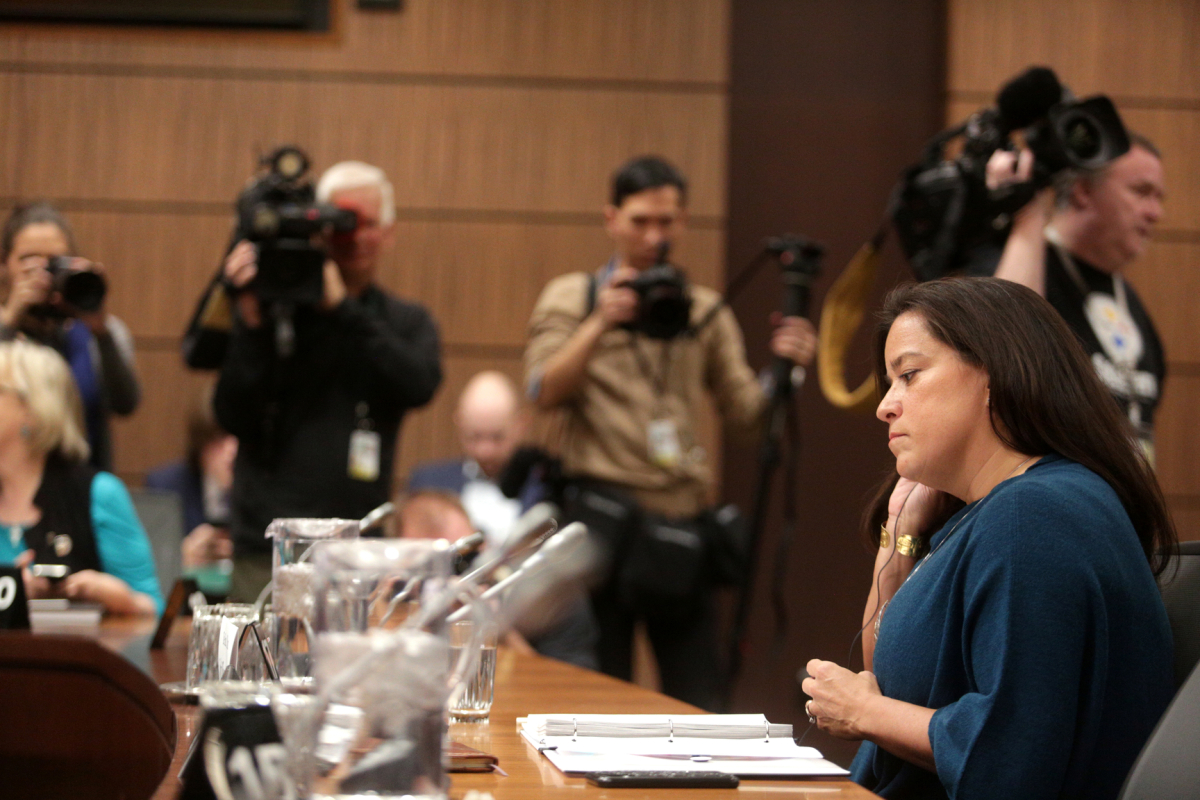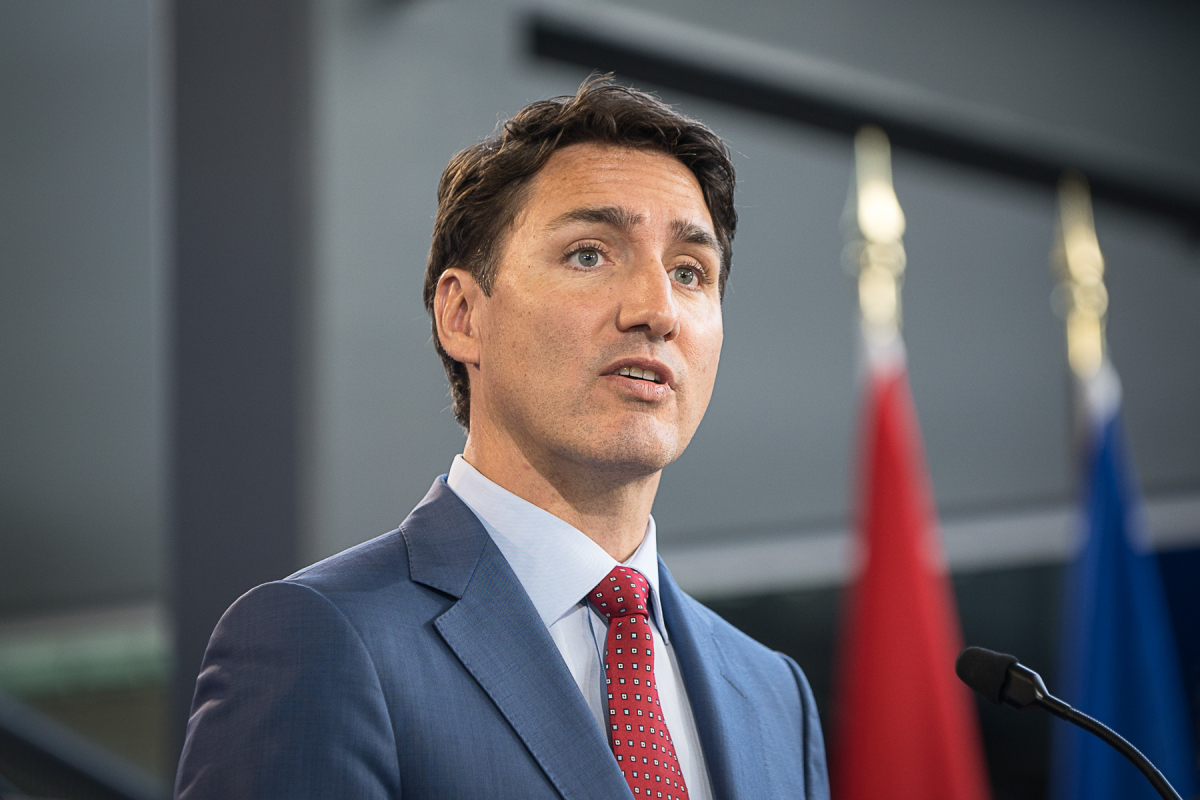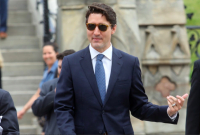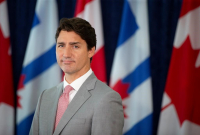Support strong Canadian climate journalism for 2025
Prime Minister Justin Trudeau held firm to his belief that his actions in the SNC-Lavalin affair were justified, hours after Canada’s ethics watchdog slammed him for violating federal law.
“I can't apologize for standing up for Canadian jobs,” Trudeau told reporters Wednesday afternoon in the southern Ontario town of Niagara-on-the-Lake.
Trudeau inappropriately pressured former attorney-general Jody Wilson-Raybould to offer the Montreal-based engineering firm the option to avoid criminal prosecution on corruption charges, Conflict of Interest and Ethics Commissioner Mario Dion found.
Hours after Dion’s investigation was released, the Prime Minister’s Office put out a related, more favourable review, authored by a former Liberal cabinet member and dated late June.
“The authority of the Prime Minister and his office was used to circumvent, undermine and ultimately attempt to discredit the decision of the Director of Public Prosecutions as well as the authority of Ms. Wilson‑Raybould as the Crown's chief law officer,” Dion said in a statement.
Trudeau later told reporters in Niagara-on-the-Lake, where he was previously scheduled to make a different announcement, that he did “fully accept this (Dion’s) report and take responsibility for everything that happened,” but that he also disagreed with some of the commissioner’s conclusions.
The SNC-Lavalin affair rocked Canadian politics earlier this year, a drama that unfolded over several months and involved high-profile resignations, secretly recorded phone calls and explosive committee testimony.
Trudeau, along with senior advisors in his office and elsewhere in government, repeatedly asked Wilson-Raybould late last year and into 2019 about allowing SNC-Lavalin to avoid criminal prosecution.
This was after the public prosecution service had already determined that a so-called deferred prosecution agreement should not be offered to the company.
Dion said Trudeau’s actions were contrary to Section 9 of the Conflict of Interest Act, which bars government officials responsible for high-level decision-making from influencing the decision of another person to "improperly further another person's private interests."
Dion’s report was expected in early September, but released without warning Wednesday. Hours later, the PMO released a separate report by former attorney general Anne McLellan, who was appointed in March to look into whether the roles of justice minister and attorney general should be separated in light of the SNC-Lavalin affair. Trudeau revealed yesterday that the McLellan report would not be released before the ethics commissioner's.
The commissioner's report is titled Trudeau II, a reference to the fact that this is the second time Trudeau has been investigated by the office. In December 2017, the office found that Trudeau had violated conflict of interest rules when he and his family vacationed on the Aga Khan's private island.
"I will be taking all precautions in the future," Trudeau told media at the time.
The prime minister had already accepted responsibility in March for being blind to an “erosion of trust” between his office and Wilson-Raybould. "I was not aware of that erosion of trust. As prime minister and leader of the federal ministry, I should have been," he said.
But at that time, as on Wednesday, he did not apologize for the affair, and continued to say there was "no inappropriate pressure” placed on the former justice minister.
Jennifer Quaid, a University of Ottawa law professor, said in an interview that the report “fingers the prime minister directly.”
“Mr. Dion does not mince words...he places the responsibility for the influence at the prime minister’s seat and he goes on to say that those in his staff who engaged in improper activities did so at his behest,” she said.
“That’s unusual in and of itself, because typically blame falls below the top. Here blame is being placed right at the top.”
In the report, Dion also criticized the Privy Council Office, a non-partisan government department that gives advice and support to the prime minister and cabinet, from blocking the ethics commissioner’s office from accessing cabinet records during the investigation.
That meant “nine witnesses were constrained” in providing evidence, Dion said. (The report notes that the PMO said it wasn't involved in the decision to withhold the records.)
“This is the most comprehensive narrative of the whole affair yet to see light of day and, reading it, it looks an awful lot like that Jody Wilson-Raybould was consistently pressured for political reasons to try and overrule the director of prosecutions,” David Moscrop, political scientist and author of Too Dumb for Democracy, said in an interview.
“You don’t get significant, detailed reports like this often on what is tantamount to significant ethical breaches at the top,” he said.

‘The appropriate avenue for dealing with these sort of breaches is the ballot box’
In a statement, Wilson-Raybould hailed Dion's findings as vindication. "The report confirms critical facts, consistent with what I shared with all Canadians, and affirms the position I have taken from the outset.
In a press conference from Regina Wednesday, Conservative Party Leader Andrew Scheer called Trudeau’s actions an “unforgivable assault” on the rule of law that will hurt him in the federal election expected in October. He also renewed calls for an RCMP investigation into the scandal.
"It's so disappointing to see a prime minister desperately attempt to cling to power,” Scheer said. “We can't believe anything (Trudeau) says anymore."
Speaking Wednesday from Victoria, NDP Leader Jagmeet Singh said Trudeau’s actions were “unacceptable.”
“The prime minister was working to benefit the interests of a multi-billionaire corporation, and he was working to benefit his own self-interest to be re-elected,” Singh said.
Moscrop believes that the report could have implications for the fall vote, expected on Oct. 21, 68 days away. He said that the findings in Dion’s report could undermine the gains in the polls the Trudeau Liberals had made in recent months.
“Andrew Scheer is right. The appropriate avenue for dealing with these sort of breaches is the ballot box,” Moscrop said. “Ultimately, people get to decide whether or not this is so significant that it merits electing someone else.”
There are no sanctions or routes for reprimand written into Dion’s report. Quaid said it seems that “the intent is that the sanction will be political.”
By legislation, the report is submitted to the prime minister and the prime minister is supposed to ensure an appropriate followup, Quaid explained.
“We’re in a unique position where the person who has been found to be in violation of his ethical violations is the prime minister himself. So the person who is empowered to follow up is also the person who is supposed to be the recipient of the followup,” she said.
Should the issue come up during the election, Trudeau will have to respond to the electorate, Quaid added.
“It’s the idea of the discipline of transparency,” she said. “Give the electorate the information about the conduct of their elected officials. In some way the sanction is the publicity and the threat that the public will react in a way that will affect the elected official negatively.”
The SNC-Lavalin affair explained
SNC-Lavalin's stock was down half a dollar at $17.25 per share as of 2:30 p.m. Eastern on Wednesday. Its shares had hit $48.50 on the Toronto Stock Exchange in January, according to Bloomberg, but their value has dropped sharply since the controversy came to light in February.
The roots of the controversy began in 2015, when the engineering firm — a major employer in Quebec — was charged with corruption and fraud.
RCMP alleged that the company tried to bribe Libyan dictator Muammar Gadhafi, among other officials, and that SNC-Lavalin lied to defraud Libyan businesses of $130 million (Gadhafi’s rule in the North African country was marked by a litany of human rights abuses).
The alleged offences by SNC-Lavalin began in 2001 and continued until 2011 when the regime collapsed, the RCMP said.
If SNC-Lavalin is found guilty, it could be blocked from federal contracts for 10 years and its current deals with the federal government could be cancelled.
When the charges were laid, Canada didn’t have a legal mechanism that would allow companies to resolve criminal charges without a trial. In 2016, SNC-Lavalin lobbied the Trudeau government to create one.
Two years later, following public consultations, the government changed the law to allow for a “deferred prosecution agreement,” which allows companies to avoid criminal trials if they agree to take certain actions outlined by the government, such as co-operating in other investigations, paying a penalty and acknowledging wrongdoing.
In September 2018, the official in charge of making such deals, the director of public prosecutions, decided against offering the option to SNC-Lavalin.
Trudeau, however, repeatedly urged Wilson-Raybould both in person and through staff to ask the director to reconsider, saying a criminal trial could hurt SNC-Lavalin’s business prospects — and even his own re-election chances as the member of Parliament for Papineau, a Montreal riding.
“Yes, I mentioned (to Wilson-Raybould) I was the member from Papineau,” Trudeau admitted in March to members of the press. “I care about the families, workers and students who live in my riding.”
Dion’s report says that efforts to influence Wilson-Raybould “runs counter to the principle of prosecutorial independence and the rule of law.”
“The repeated interventions by the Prime Minister, his most senior ministerial staff and public officials to have the Attorney General find a solution, even in the face of her refusal to intervene in the matter, lead me to conclude that these actions were tantamount to political direction,” the report says.
Soon after Trudeau's Liberals were elected in 2015, the government also entered into a second, confidential "administrative agreement" with SNC-Lavalin that would allow it to continue scoring lucrative public contracts.
The allegations of undue pressure on Wilson-Raybould first surfaced in a Feb. 7, 2019 Globe and Mail story. The report touched off a cascade of resignations, including that of Wilson-Raybould, key Trudeau adviser Gerald Butts and high-profile cabinet minister Jane Philpott, who said she’d lost confidence in the Trudeau government.

Butts has since been re-hired to work on Trudueau’s re-election team. On Wednesday, Trudeau wouldn’t say if he’d remove Butts from the role or fire anyone else who was involved in the scandal.
Though Trudeau wasn’t successful in his attempts to influence Wilson-Raybould, he still sought to “improperly” further SNC-Lavalin’s business interests, Dion found.
“The evidence showed that SNC-Lavalin had significant financial interests in deferring prosecution,” the report reads. “These interests would likely have been furthered had Mr. Trudeau successfully influenced the attorney-general to intervene in the director of public prosecutions' decision.”
Quaid said SNC-Lavalin is “a beneficiary of the efforts by the prime minister” but didn’t have any part in the ethical breaches found in Dion’s report.
“You can’t attach any blame to them that the prime minister wrongly tried to arrange things from them,” she said.
Canada’s democratic institutions are built on the idea that there’s a line between the rule of law and electoral politics, Moscrop said.
The line has been breached in the past by former prime ministers Stephen Harper and Jean Chretien, but this instance is notable, Moscrop said, because of “the degree to which the prime minister is implicated and what seems to be some fairly serious poor judgments and his defence of it.”
“Through the spring into the summer, (Trudeau) continually doubled down on his defence that he had done nothing wrong,” Moscrop said. “This report suggests, pretty starkly, that he was wrong.”
The second SNC-Lavalin report
In March Trudeau appointed McLellan, who was attorney general from 1997 to 2002, to assess whether the roles of minister of justice and attorney general should continue to be held by the same person and to review how public servants and political staff interact with the person or people filling those roles.
“It is clear to me that there is no system for managing prosecutorial decisions that absolutely protects against the possibility of partisan interference, while providing for public accountability,” the McLellan report reads. “I do not believe that further structural change is required in Canada to protect prosecutorial independence and promote public confidence in the criminal justice system.”
The report says that having the two roles filled by one person was a deliberate decision that dates back to Confederation. It means the attorney general can provide more fulsome legal advice to cabinet because that person “understands the political context in which they are operating.”
McLellan's report also says that concerns about the joined roles could be addressed through various measures. Those could include clear rules on how ministers should behave, training for ministers and others on the role of the attorney general, a new oath of office that recognizes the attorney general’s unique role and changes to several procedural manuals.
On Wednesday, Trudeau said that the SNC-Lavalin affair “shouldn’t have happened,” and he would reply on McLellan’s report to make changes to prevent it from happening in future governments.










Comments
What we have here is a person who believes that his beliefs justified breaking the rule of law for the greater good. (I do not believe that jobs were his motivation).
Those citizens who took actions such as protesting at the Burnaby TransMountain tank farm, also believe their actions are justified for the greater good of us all, a liveable planet.
They have gone to court and are paying for breaking the law. What will Trudeau’s fate be? Will justice indeed be blind?
Trudeau won't apologize for "standing up for Canadian jobs." But that's not what he did. The vast majority of Canadian jobs are not at SNC-Lavalin. He SHOULD apologize for undermining our democracy's checks and balances, and then resign as PM.
Oh--and leader of the Liberal party as well.
I totally concur with Vivian Unger. Trudeau's resignation is in order, and all members of the party and staff who can be shown to have inappropriately exerted political pressure on the attorney general respecting the SNC Lavalin matter.
The integrity or judgement of any politician of any stripe should not be judged by one good or bad decision alone.
The balance of decisions between good and bad and the net cumulative impact on the national interest are more critical.
There was not 'one good or bad decision', there were successive decisions made. Day after day the decisions were reapplied. And ministers were ejected from caucus for their efforts to uphold the integrity of the legal system.